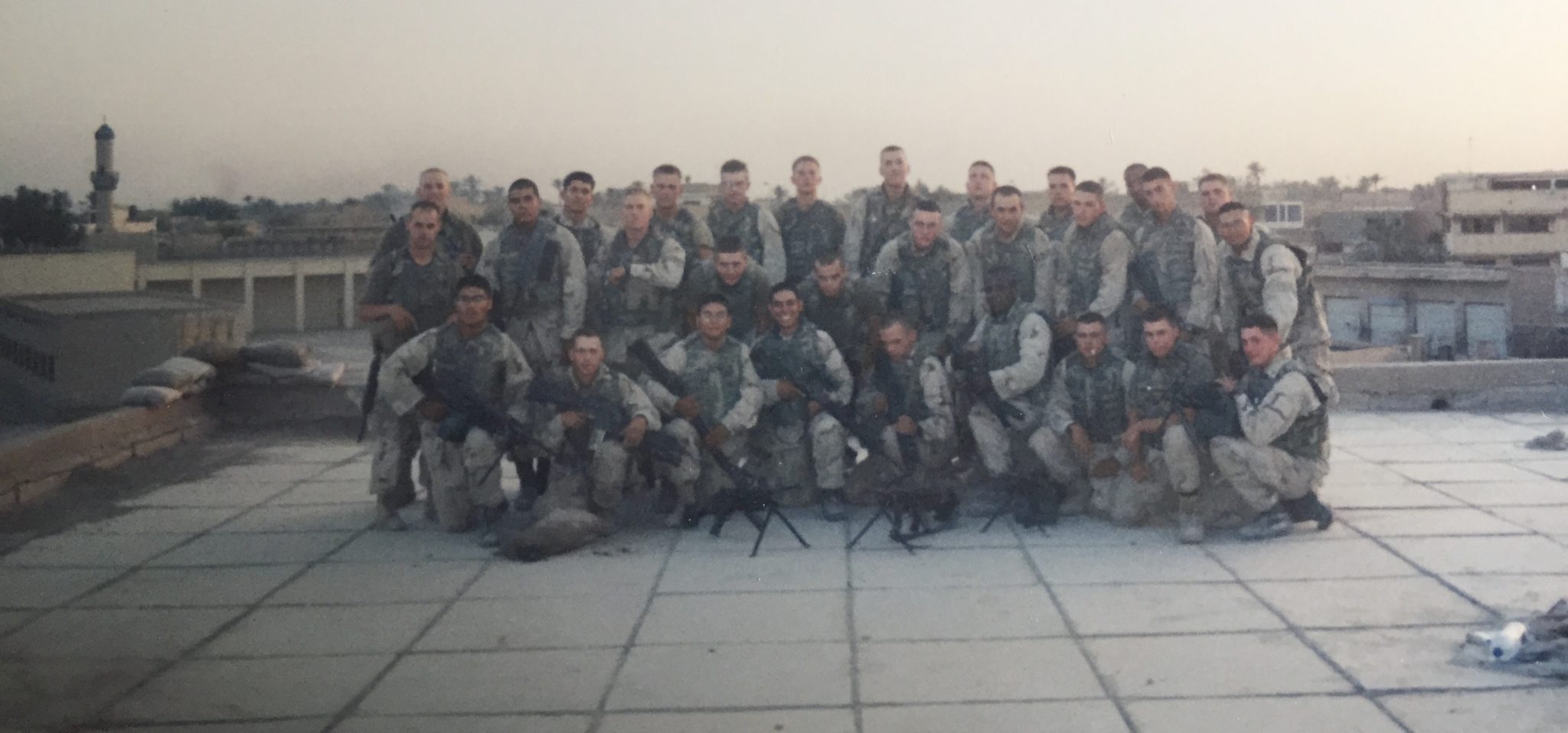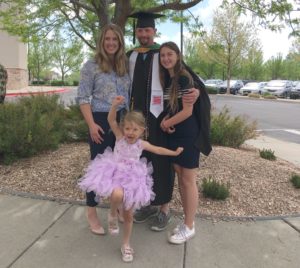Eric Smith was among the first U.S. Marines on the ground during the 2003 invasion of Iraq.
Years later, he benefited from the New Start for Student Veterans as an undergraduate at Colorado State University.
This spring, Smith completed his master’s degree in social work with an internship at New Start, where he helped other CSU student-veterans get through what he experienced himself.
His story is largely about timing — being in the right place at the right time, and vice versa.
A military family
After graduating from high school, the native of Montrose enlisted in the Marines because of his family’s long record of military service. His grandfather had been among the soldiers storming Utah Beach on D Day during World War II. Smith has a Nazi flag that his grandfather used as a kind of war journal, and it bears many of his fellow soldiers’ signatures as well as names of the many battles he fought in around Europe. Similarly, Smith secured an Iraqi flag that he carried with him through the many battles he engaged in during his time in An Nasiriyah.
Smith enlisted in the Marines in late August 2001, just a couple of weeks before the 9/11 attacks.
In spring 2003, as he was preparing to deploy to Japan, his orders changed at the last minute and he found himself on the USS Saipan, a Navy ship headed for Kuwait. He served with the 1st Battalion 2nd Marines, which was part of the larger group known as Task Force Tarawa.
“We were the tip of the spear,” Smith recalls. “We were one of the first to cross the line of departure from Kuwait headed north.”
He describes the mission as “search and destroy.” The Marines were in full protective suits because of the imminent threat of biological/chemical warfare. At one point his convoy stopped to refuel, but another convoy — where a soldier named Jessica Lynch was serving with the 507th Maintenance Company — kept going and was trapped in a well-publicized ambush in which Lynch was taken hostage, and later rescued during joint operations that included elements from the Marine Corps, Army and Navy.
More near disasters
Recounting the heavy burden of war and his experiences during the battle of An Nasiriyah, Smith describes a muddy, chaotic, urban warfare environment where there was no way of predicting where danger would come from. Not only did his unit clear and secure many buildings containing enemy combatants, they routinely took fire from the enemy and were sometimes pinned down in pockets. That kind of warfare made it difficult to support enemy engagement efforts and evacuate dead and wounded Marines from Charlie Company, which suffered 18 casualties from a friendly fire incident involving an A-10 Warthog aircraft.
Smith says his squad dodged rocket-propelled grenades (RPGs), sniper fire and mortars. In one of many near-disastrous events, a dud mortar landed right in front of Smith and a fellow Marine. However, the incident that almost killed him was an RPG that flew right over him and a buddy, hitting a door they were about to move through.
“It hit the door and blew us back onto the ground,” Smith says. “I remember trying to move, but couldn’t for a few seconds, and when I finally could, I frantically felt my whole body to make sure everything was where it was supposed to be. And thank God it was; just my gear suffered.”

Smith, middle, with fellow Marines during his military service in the Middle East.
Second tour
During his second tour in Iraq, in the Al-Anbar province in 2004-2005, he encountered just as many disasters as in his first — but there was a different mission in mind. His unit was charged with winning the hearts and minds of the Iraqi people, training the Iraqi military and local police force and rooting out any insurgent activity. But that was difficult because the enemy adopted guerilla warfare techniques and the heavy use of improvised explosive devices (IEDs).
“Almost every day on patrol we would encounter at least one IED, as well as ambushes and mortar attacks,” Smith recounts. “Close calls become a way of life.”
Smith lost many fellow Marines who were close friends during the tour, including his roommate. The loss of his friends and the many close calls led him to the realization that life is precious.
“We have a duty, as the living, to make the best of it,” he says, “and take advantage of all America has to offer, because many great men and women in our armed forces gave all for the rights and privileges we are afforded.”
Return to Colorado
He declined to serve a third tour, came home to Montrose and enrolled at Mesa State University, but Smith soon realized that he was having trouble remembering what he had learned before the war. He was suffering from a traumatic brain injury as well as post-traumatic stress.
Then Smith moved to Denver and met his wife, Virginia.
“She became the pillar of my life,” he says. “She created a stable new environment for me; I was extremely lucky. To this day I couldn’t tell you what she saw in me.”
The couple had their first of two daughters, moved to Loveland, and Smith graduated from Aims Community College in 2012 before taking a job in the Denver area with the U.S. Department of Veterans Affairs. There, providing support for health-care programs for veterans, Smith became interested in the behavioral health field — and found co-workers who took him under their wing and helped him reintegrate into society.
“It’s almost like you need to be given permission to reintegrate,” he says. “Sometimes you wonder if it’s OK to ask for help. You have to remember that you have always needed assistance in one way or another, such as a call-in for an airstrike or artillery. Calling in for supports just looks different in the civilian world, but it’s the same thing. You can’t complete the mission alone.”

Smith can be seen in the lower right of this group photo.
Arriving at CSU
He took another job closer to home, at a U.S. Department of Agriculture office in Fort Collins, and then earned admission to CSU. Smith quickly found two university offices that proved invaluable: New Start for Student Veterans and Adult Learner and Veteran Services. The two CSU organizations connected him to a variety of resources on campus that helped him excel.
“They make you feel like you’ve been accepted back into a community,” Smith says. “It was extremely useful, just priceless. They were unconditionally supportive.”
Getting his undergraduate degree in social work — and taking full advantage of the resources provided by New Start and ALVS — made Smith more self-aware.
“I was able to understand why I wasn’t learning the way I should have been learning,” he says. “You don’t know what you don’t know, but social work requires a lot of self-reflection. You’ve got to understand your place in society before you can help someone else with their place in society.”
A supportive triangle
He said the social work department, New Start and ALVS served as kind of a triangle of support for him.
“They remind you of the strengths you have,” Smith explained. “We all developed knowledge, skills and abilities, or KSAs, in the armed forces, regardless of our military occupation. And these KSAs have been put to the test in multiple situations where it mattered most. The new challenge is learning how to translate these KSAs into civilian life. This is where CSU’s New Start and ALVS programs excel. These departments act as a safe place where veterans can gain assistance with transitioning their KSAs obtained in the armed forces to the civilian/academic life, and eventually post-graduation employment.”
In his internship at New Start, which was required to earn his master’s degree in social work this month, he worked with student-veterans who are struggling with some of the same issues he encountered.
“Being at New Start, I wouldn’t have it any other way; it affords a place to give back,” he says.
He explains that every veteran brings to New Start different experiences and perspectives. Some act as positive reinforcements when it comes to transition, others not so much. Society tends to relate veterans’ transitional challenges to experiences faced while in the military, and while this can be the case, it doesn’t acknowledge the whole picture, Smith says.
Multiple identities
For many veterans, the same social challenges they faced before they entered the military are the same challenges they face when they get out.
“All transitional services must not only acknowledge the veteran identity within the individual, but all identities that intersect with the veteran’s identity,” he explains.
The collaborative nature between New Start and the ALVS office created an environment where Smith could use his social work skills to assist veterans in discovering or rediscovering their strengths.
Smith adds that his experiences have given him crucial perspective on what’s important in life.
“Throughout history, there have been many individuals who have bravely defended the U.S. and its allies,” he says. “These individuals, whether we are aware of it or not, have come from a host of diverse backgrounds that are filled with many identities. This mix of individuals is what makes not only our armed forces so powerful, but also what makes America so powerful. It is now more important than ever to acknowledge each other’s uniqueness and unite as a whole. What’s most important is that we continue to fight for social justice so that everyone, regardless of their identity, can not only survive but thrive in this great nation.”
